Unilever Case Study: Talent Management and Performance Analysis
VerifiedAdded on 2023/06/12
|43
|10239
|491
Report
AI Summary
This research report delves into talent management strategies, particularly focusing on their impact on organizational performance, with a specific aim to identify effective strategies for attracting and retaining top talent within Unilever plc. The study addresses key research questions related to the definition of talent management, the best strategies adopted in the retail sector for talent acquisition and retention, and the overall impact of these strategies on organizational performance in the UK. Through a comprehensive literature review, the report examines various themes, including the concept of talent management, strategies for attracting and retaining talent, and the effect of talent management on organizational performance. The research methodology involves data analysis, discussion, and the formulation of recommendations for Unilever plc, along with considerations for future implications. The findings emphasize the importance of talent management in improving employee productivity, reducing staff turnover, and boosting employee morale, ultimately contributing to enhanced business performance and competitive advantage.
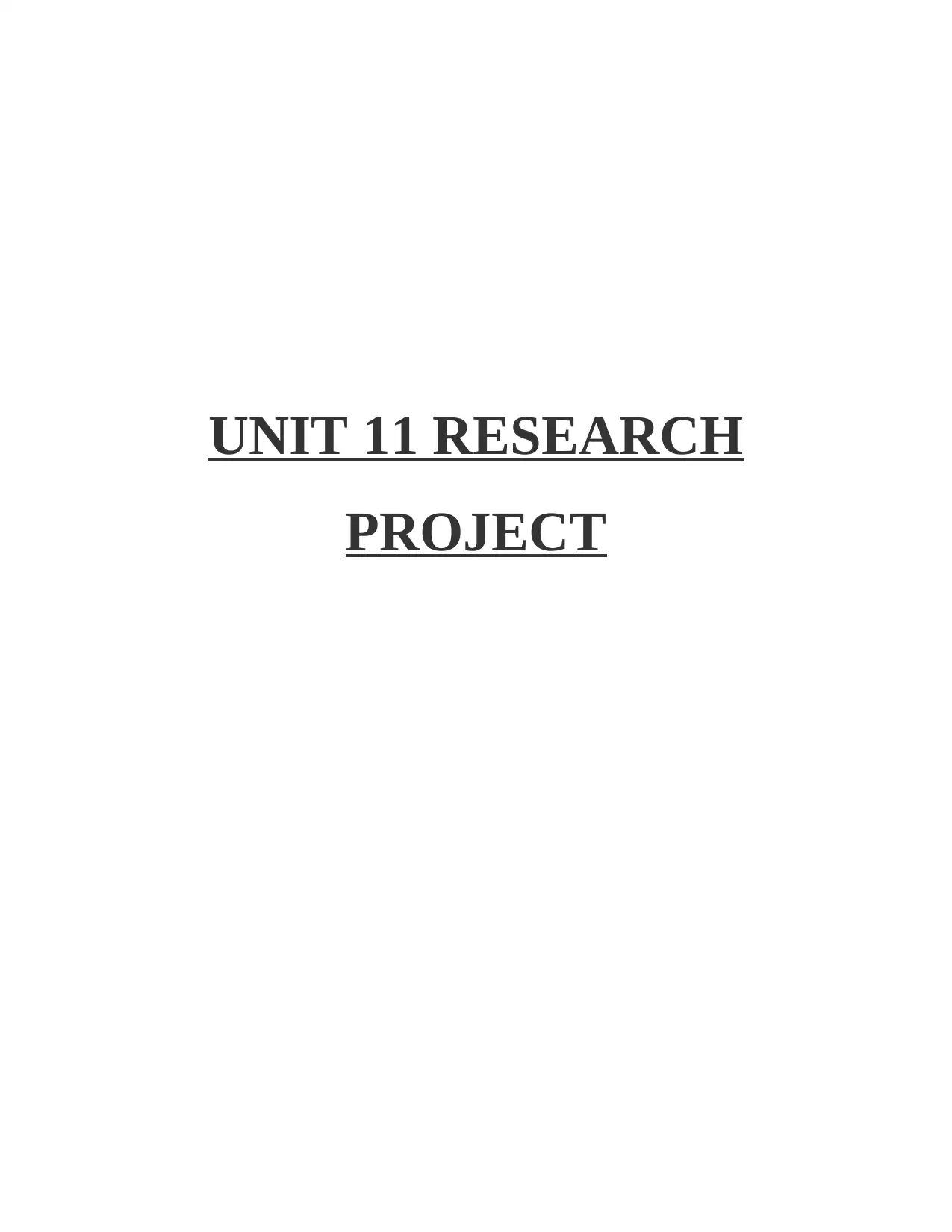
UNIT 11 RESEARCH
PROJECT
PROJECT
Paraphrase This Document
Need a fresh take? Get an instant paraphrase of this document with our AI Paraphraser
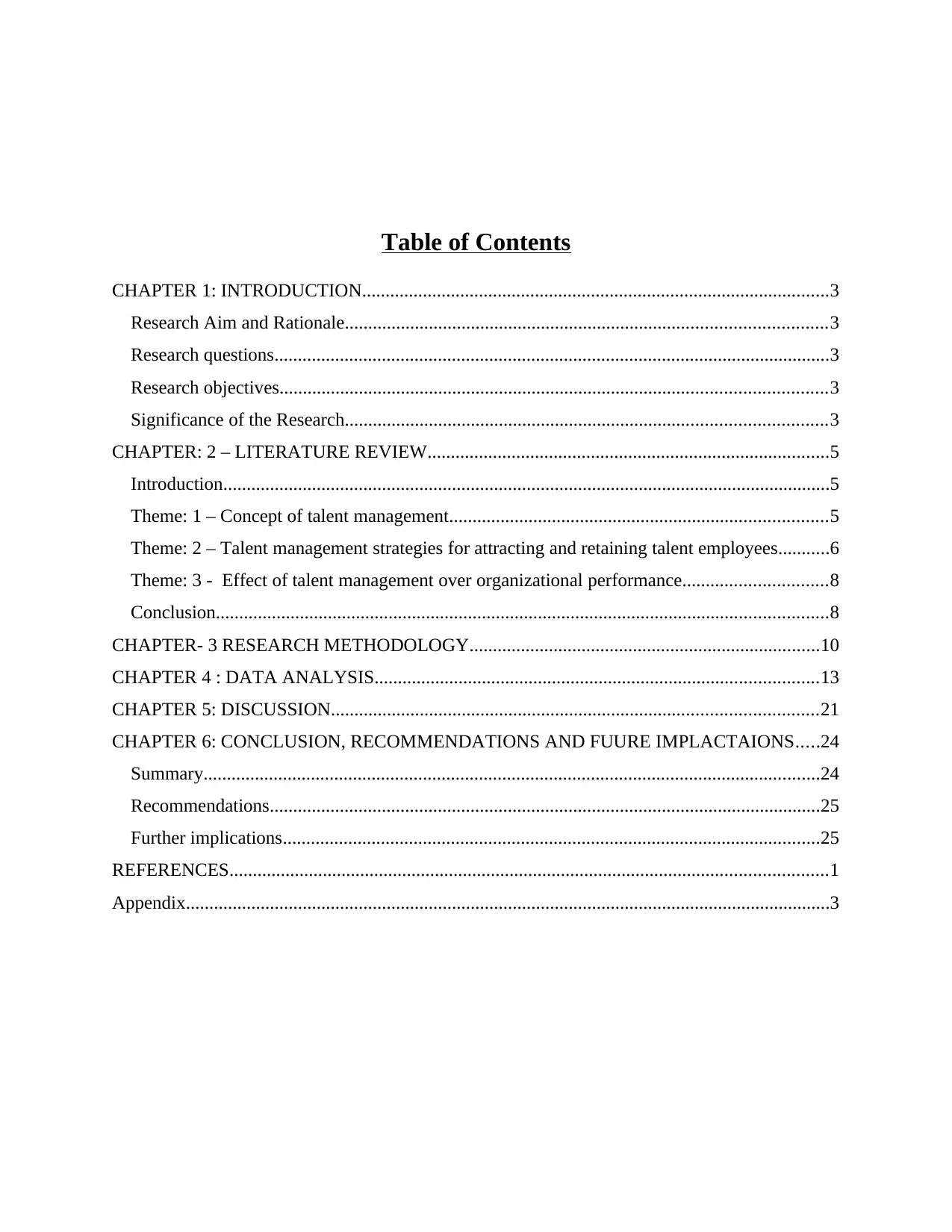
Table of Contents
CHAPTER 1: INTRODUCTION....................................................................................................3
Research Aim and Rationale.......................................................................................................3
Research questions.......................................................................................................................3
Research objectives.....................................................................................................................3
Significance of the Research.......................................................................................................3
CHAPTER: 2 – LITERATURE REVIEW......................................................................................5
Introduction..................................................................................................................................5
Theme: 1 – Concept of talent management.................................................................................5
Theme: 2 – Talent management strategies for attracting and retaining talent employees...........6
Theme: 3 - Effect of talent management over organizational performance...............................8
Conclusion...................................................................................................................................8
CHAPTER- 3 RESEARCH METHODOLOGY...........................................................................10
CHAPTER 4 : DATA ANALYSIS...............................................................................................13
CHAPTER 5: DISCUSSION........................................................................................................21
CHAPTER 6: CONCLUSION, RECOMMENDATIONS AND FUURE IMPLACTAIONS.....24
Summary....................................................................................................................................24
Recommendations......................................................................................................................25
Further implications...................................................................................................................25
REFERENCES................................................................................................................................1
Appendix..........................................................................................................................................3
CHAPTER 1: INTRODUCTION....................................................................................................3
Research Aim and Rationale.......................................................................................................3
Research questions.......................................................................................................................3
Research objectives.....................................................................................................................3
Significance of the Research.......................................................................................................3
CHAPTER: 2 – LITERATURE REVIEW......................................................................................5
Introduction..................................................................................................................................5
Theme: 1 – Concept of talent management.................................................................................5
Theme: 2 – Talent management strategies for attracting and retaining talent employees...........6
Theme: 3 - Effect of talent management over organizational performance...............................8
Conclusion...................................................................................................................................8
CHAPTER- 3 RESEARCH METHODOLOGY...........................................................................10
CHAPTER 4 : DATA ANALYSIS...............................................................................................13
CHAPTER 5: DISCUSSION........................................................................................................21
CHAPTER 6: CONCLUSION, RECOMMENDATIONS AND FUURE IMPLACTAIONS.....24
Summary....................................................................................................................................24
Recommendations......................................................................................................................25
Further implications...................................................................................................................25
REFERENCES................................................................................................................................1
Appendix..........................................................................................................................................3
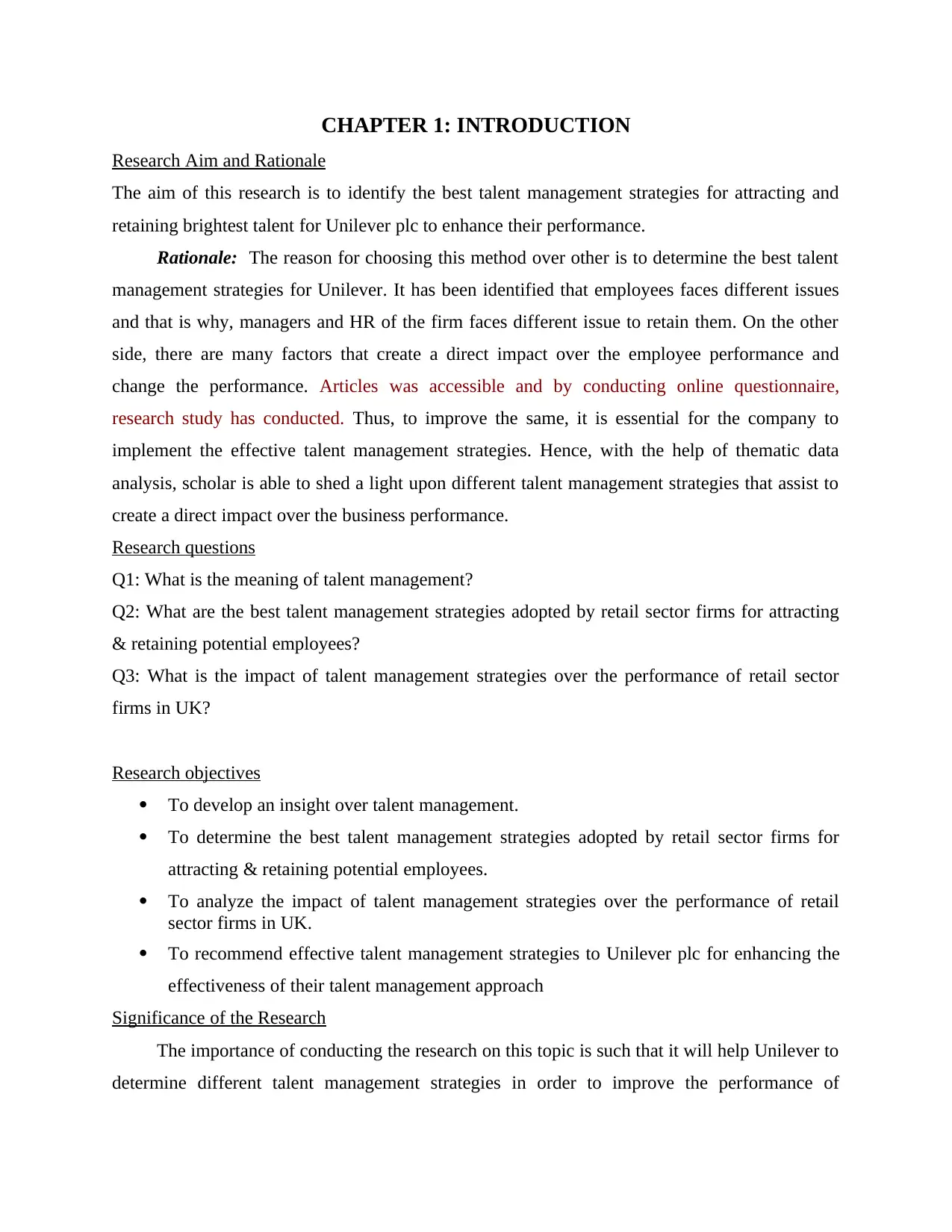
CHAPTER 1: INTRODUCTION
Research Aim and Rationale
The aim of this research is to identify the best talent management strategies for attracting and
retaining brightest talent for Unilever plc to enhance their performance.
Rationale: The reason for choosing this method over other is to determine the best talent
management strategies for Unilever. It has been identified that employees faces different issues
and that is why, managers and HR of the firm faces different issue to retain them. On the other
side, there are many factors that create a direct impact over the employee performance and
change the performance. Articles was accessible and by conducting online questionnaire,
research study has conducted. Thus, to improve the same, it is essential for the company to
implement the effective talent management strategies. Hence, with the help of thematic data
analysis, scholar is able to shed a light upon different talent management strategies that assist to
create a direct impact over the business performance.
Research questions
Q1: What is the meaning of talent management?
Q2: What are the best talent management strategies adopted by retail sector firms for attracting
& retaining potential employees?
Q3: What is the impact of talent management strategies over the performance of retail sector
firms in UK?
Research objectives
To develop an insight over talent management.
To determine the best talent management strategies adopted by retail sector firms for
attracting & retaining potential employees.
To analyze the impact of talent management strategies over the performance of retail
sector firms in UK.
To recommend effective talent management strategies to Unilever plc for enhancing the
effectiveness of their talent management approach
Significance of the Research
The importance of conducting the research on this topic is such that it will help Unilever to
determine different talent management strategies in order to improve the performance of
Research Aim and Rationale
The aim of this research is to identify the best talent management strategies for attracting and
retaining brightest talent for Unilever plc to enhance their performance.
Rationale: The reason for choosing this method over other is to determine the best talent
management strategies for Unilever. It has been identified that employees faces different issues
and that is why, managers and HR of the firm faces different issue to retain them. On the other
side, there are many factors that create a direct impact over the employee performance and
change the performance. Articles was accessible and by conducting online questionnaire,
research study has conducted. Thus, to improve the same, it is essential for the company to
implement the effective talent management strategies. Hence, with the help of thematic data
analysis, scholar is able to shed a light upon different talent management strategies that assist to
create a direct impact over the business performance.
Research questions
Q1: What is the meaning of talent management?
Q2: What are the best talent management strategies adopted by retail sector firms for attracting
& retaining potential employees?
Q3: What is the impact of talent management strategies over the performance of retail sector
firms in UK?
Research objectives
To develop an insight over talent management.
To determine the best talent management strategies adopted by retail sector firms for
attracting & retaining potential employees.
To analyze the impact of talent management strategies over the performance of retail
sector firms in UK.
To recommend effective talent management strategies to Unilever plc for enhancing the
effectiveness of their talent management approach
Significance of the Research
The importance of conducting the research on this topic is such that it will help Unilever to
determine different talent management strategies in order to improve the performance of
⊘ This is a preview!⊘
Do you want full access?
Subscribe today to unlock all pages.

Trusted by 1+ million students worldwide
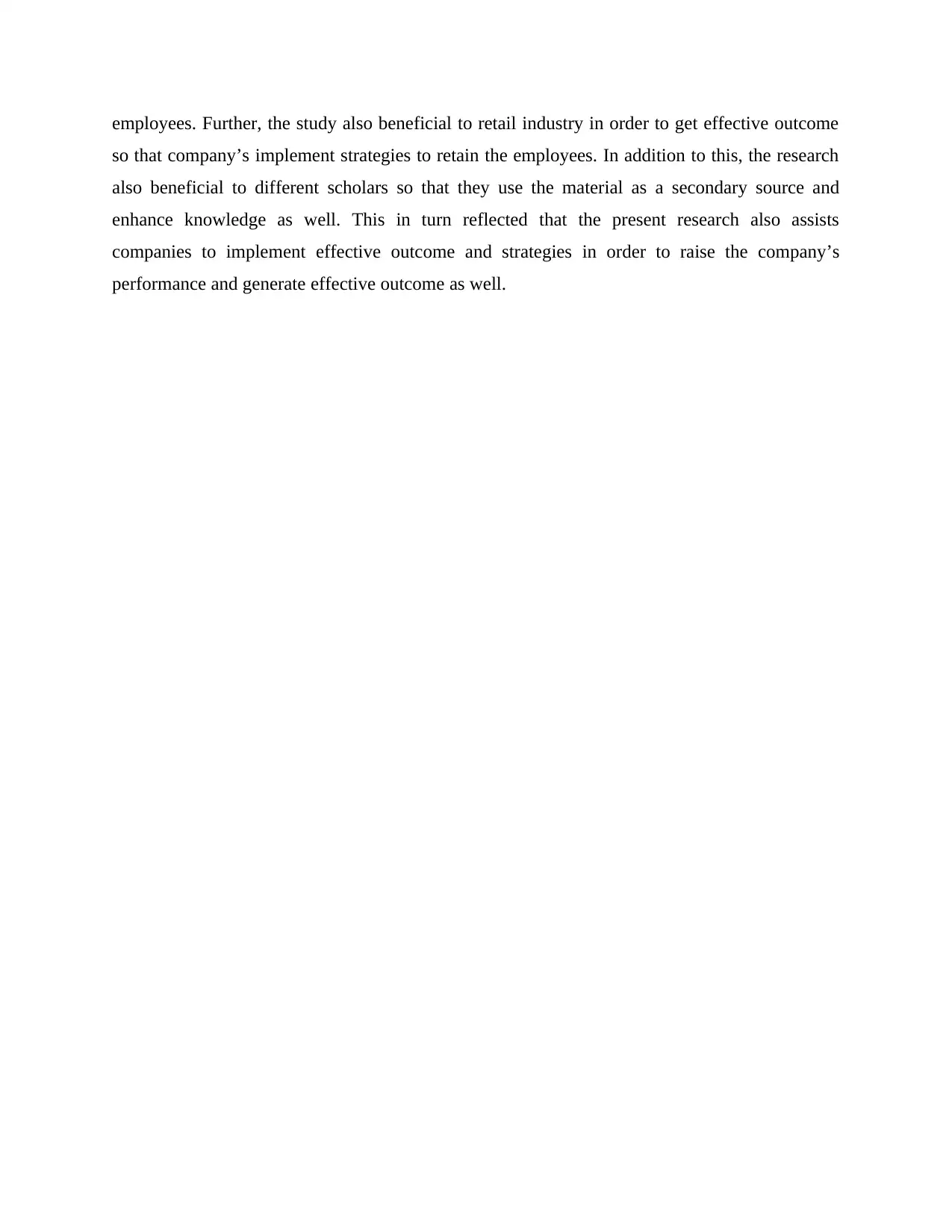
employees. Further, the study also beneficial to retail industry in order to get effective outcome
so that company’s implement strategies to retain the employees. In addition to this, the research
also beneficial to different scholars so that they use the material as a secondary source and
enhance knowledge as well. This in turn reflected that the present research also assists
companies to implement effective outcome and strategies in order to raise the company’s
performance and generate effective outcome as well.
so that company’s implement strategies to retain the employees. In addition to this, the research
also beneficial to different scholars so that they use the material as a secondary source and
enhance knowledge as well. This in turn reflected that the present research also assists
companies to implement effective outcome and strategies in order to raise the company’s
performance and generate effective outcome as well.
Paraphrase This Document
Need a fresh take? Get an instant paraphrase of this document with our AI Paraphraser
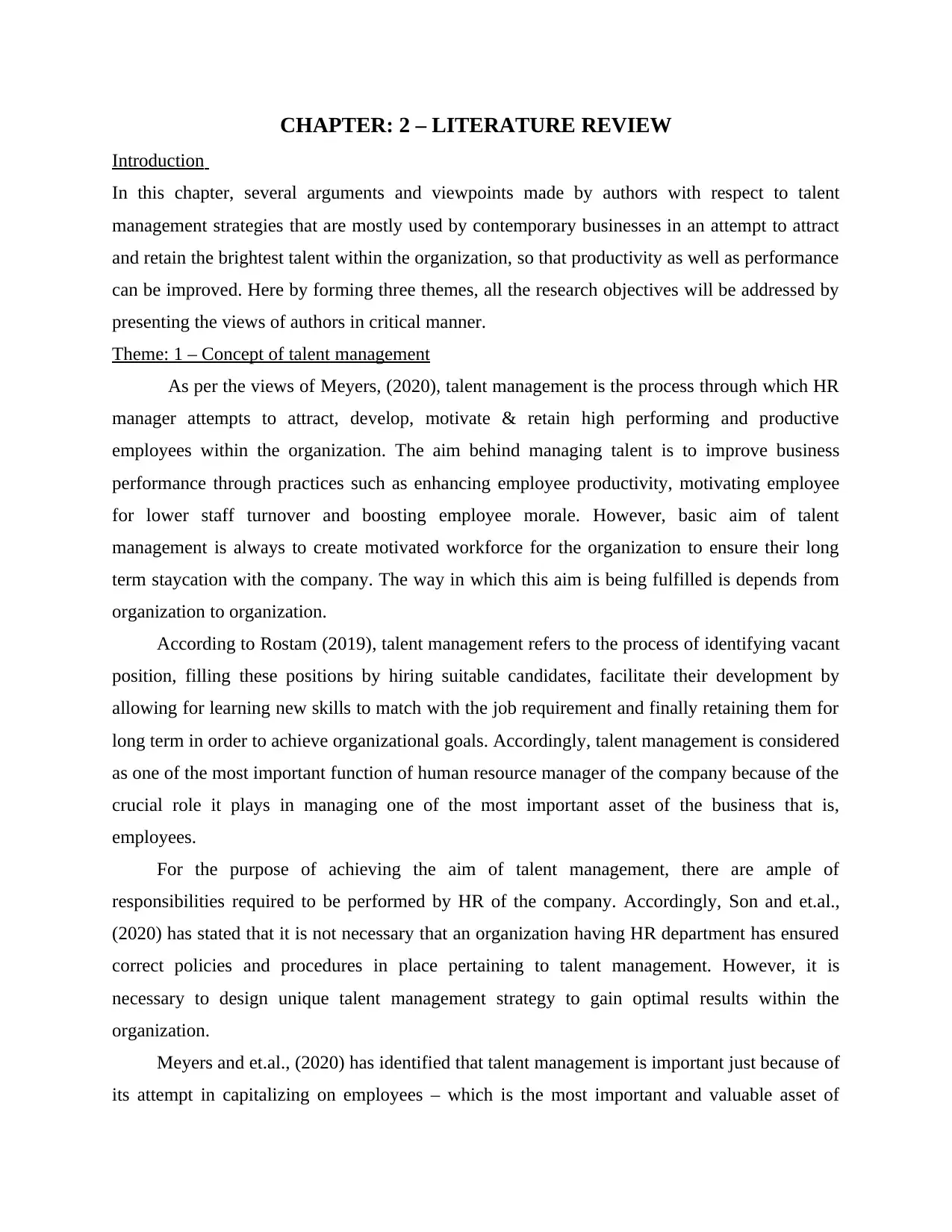
CHAPTER: 2 – LITERATURE REVIEW
Introduction
In this chapter, several arguments and viewpoints made by authors with respect to talent
management strategies that are mostly used by contemporary businesses in an attempt to attract
and retain the brightest talent within the organization, so that productivity as well as performance
can be improved. Here by forming three themes, all the research objectives will be addressed by
presenting the views of authors in critical manner.
Theme: 1 – Concept of talent management
As per the views of Meyers, (2020), talent management is the process through which HR
manager attempts to attract, develop, motivate & retain high performing and productive
employees within the organization. The aim behind managing talent is to improve business
performance through practices such as enhancing employee productivity, motivating employee
for lower staff turnover and boosting employee morale. However, basic aim of talent
management is always to create motivated workforce for the organization to ensure their long
term staycation with the company. The way in which this aim is being fulfilled is depends from
organization to organization.
According to Rostam (2019), talent management refers to the process of identifying vacant
position, filling these positions by hiring suitable candidates, facilitate their development by
allowing for learning new skills to match with the job requirement and finally retaining them for
long term in order to achieve organizational goals. Accordingly, talent management is considered
as one of the most important function of human resource manager of the company because of the
crucial role it plays in managing one of the most important asset of the business that is,
employees.
For the purpose of achieving the aim of talent management, there are ample of
responsibilities required to be performed by HR of the company. Accordingly, Son and et.al.,
(2020) has stated that it is not necessary that an organization having HR department has ensured
correct policies and procedures in place pertaining to talent management. However, it is
necessary to design unique talent management strategy to gain optimal results within the
organization.
Meyers and et.al., (2020) has identified that talent management is important just because of
its attempt in capitalizing on employees – which is the most important and valuable asset of
Introduction
In this chapter, several arguments and viewpoints made by authors with respect to talent
management strategies that are mostly used by contemporary businesses in an attempt to attract
and retain the brightest talent within the organization, so that productivity as well as performance
can be improved. Here by forming three themes, all the research objectives will be addressed by
presenting the views of authors in critical manner.
Theme: 1 – Concept of talent management
As per the views of Meyers, (2020), talent management is the process through which HR
manager attempts to attract, develop, motivate & retain high performing and productive
employees within the organization. The aim behind managing talent is to improve business
performance through practices such as enhancing employee productivity, motivating employee
for lower staff turnover and boosting employee morale. However, basic aim of talent
management is always to create motivated workforce for the organization to ensure their long
term staycation with the company. The way in which this aim is being fulfilled is depends from
organization to organization.
According to Rostam (2019), talent management refers to the process of identifying vacant
position, filling these positions by hiring suitable candidates, facilitate their development by
allowing for learning new skills to match with the job requirement and finally retaining them for
long term in order to achieve organizational goals. Accordingly, talent management is considered
as one of the most important function of human resource manager of the company because of the
crucial role it plays in managing one of the most important asset of the business that is,
employees.
For the purpose of achieving the aim of talent management, there are ample of
responsibilities required to be performed by HR of the company. Accordingly, Son and et.al.,
(2020) has stated that it is not necessary that an organization having HR department has ensured
correct policies and procedures in place pertaining to talent management. However, it is
necessary to design unique talent management strategy to gain optimal results within the
organization.
Meyers and et.al., (2020) has identified that talent management is important just because of
its attempt in capitalizing on employees – which is the most important and valuable asset of
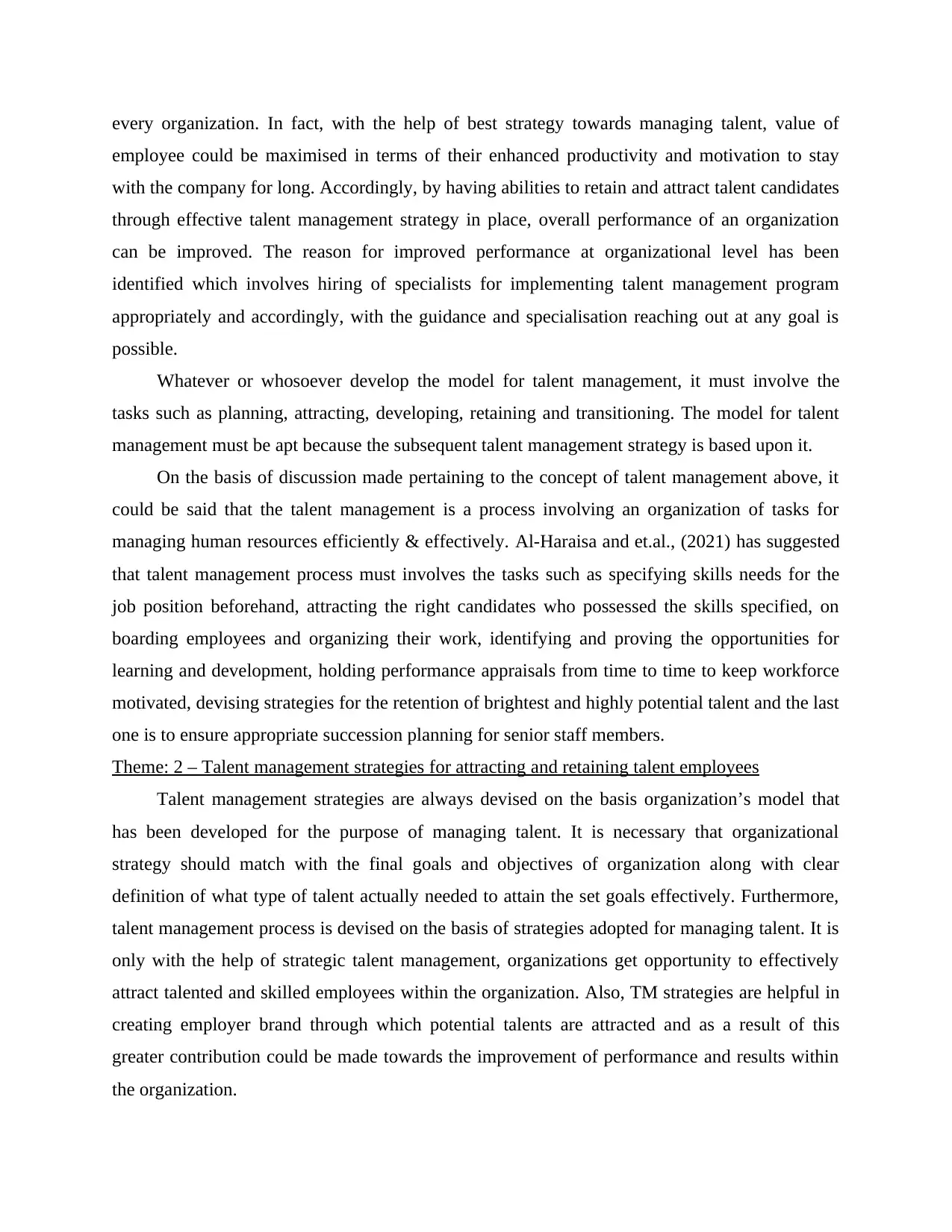
every organization. In fact, with the help of best strategy towards managing talent, value of
employee could be maximised in terms of their enhanced productivity and motivation to stay
with the company for long. Accordingly, by having abilities to retain and attract talent candidates
through effective talent management strategy in place, overall performance of an organization
can be improved. The reason for improved performance at organizational level has been
identified which involves hiring of specialists for implementing talent management program
appropriately and accordingly, with the guidance and specialisation reaching out at any goal is
possible.
Whatever or whosoever develop the model for talent management, it must involve the
tasks such as planning, attracting, developing, retaining and transitioning. The model for talent
management must be apt because the subsequent talent management strategy is based upon it.
On the basis of discussion made pertaining to the concept of talent management above, it
could be said that the talent management is a process involving an organization of tasks for
managing human resources efficiently & effectively. Al-Haraisa and et.al., (2021) has suggested
that talent management process must involves the tasks such as specifying skills needs for the
job position beforehand, attracting the right candidates who possessed the skills specified, on
boarding employees and organizing their work, identifying and proving the opportunities for
learning and development, holding performance appraisals from time to time to keep workforce
motivated, devising strategies for the retention of brightest and highly potential talent and the last
one is to ensure appropriate succession planning for senior staff members.
Theme: 2 – Talent management strategies for attracting and retaining talent employees
Talent management strategies are always devised on the basis organization’s model that
has been developed for the purpose of managing talent. It is necessary that organizational
strategy should match with the final goals and objectives of organization along with clear
definition of what type of talent actually needed to attain the set goals effectively. Furthermore,
talent management process is devised on the basis of strategies adopted for managing talent. It is
only with the help of strategic talent management, organizations get opportunity to effectively
attract talented and skilled employees within the organization. Also, TM strategies are helpful in
creating employer brand through which potential talents are attracted and as a result of this
greater contribution could be made towards the improvement of performance and results within
the organization.
employee could be maximised in terms of their enhanced productivity and motivation to stay
with the company for long. Accordingly, by having abilities to retain and attract talent candidates
through effective talent management strategy in place, overall performance of an organization
can be improved. The reason for improved performance at organizational level has been
identified which involves hiring of specialists for implementing talent management program
appropriately and accordingly, with the guidance and specialisation reaching out at any goal is
possible.
Whatever or whosoever develop the model for talent management, it must involve the
tasks such as planning, attracting, developing, retaining and transitioning. The model for talent
management must be apt because the subsequent talent management strategy is based upon it.
On the basis of discussion made pertaining to the concept of talent management above, it
could be said that the talent management is a process involving an organization of tasks for
managing human resources efficiently & effectively. Al-Haraisa and et.al., (2021) has suggested
that talent management process must involves the tasks such as specifying skills needs for the
job position beforehand, attracting the right candidates who possessed the skills specified, on
boarding employees and organizing their work, identifying and proving the opportunities for
learning and development, holding performance appraisals from time to time to keep workforce
motivated, devising strategies for the retention of brightest and highly potential talent and the last
one is to ensure appropriate succession planning for senior staff members.
Theme: 2 – Talent management strategies for attracting and retaining talent employees
Talent management strategies are always devised on the basis organization’s model that
has been developed for the purpose of managing talent. It is necessary that organizational
strategy should match with the final goals and objectives of organization along with clear
definition of what type of talent actually needed to attain the set goals effectively. Furthermore,
talent management process is devised on the basis of strategies adopted for managing talent. It is
only with the help of strategic talent management, organizations get opportunity to effectively
attract talented and skilled employees within the organization. Also, TM strategies are helpful in
creating employer brand through which potential talents are attracted and as a result of this
greater contribution could be made towards the improvement of performance and results within
the organization.
⊘ This is a preview!⊘
Do you want full access?
Subscribe today to unlock all pages.

Trusted by 1+ million students worldwide
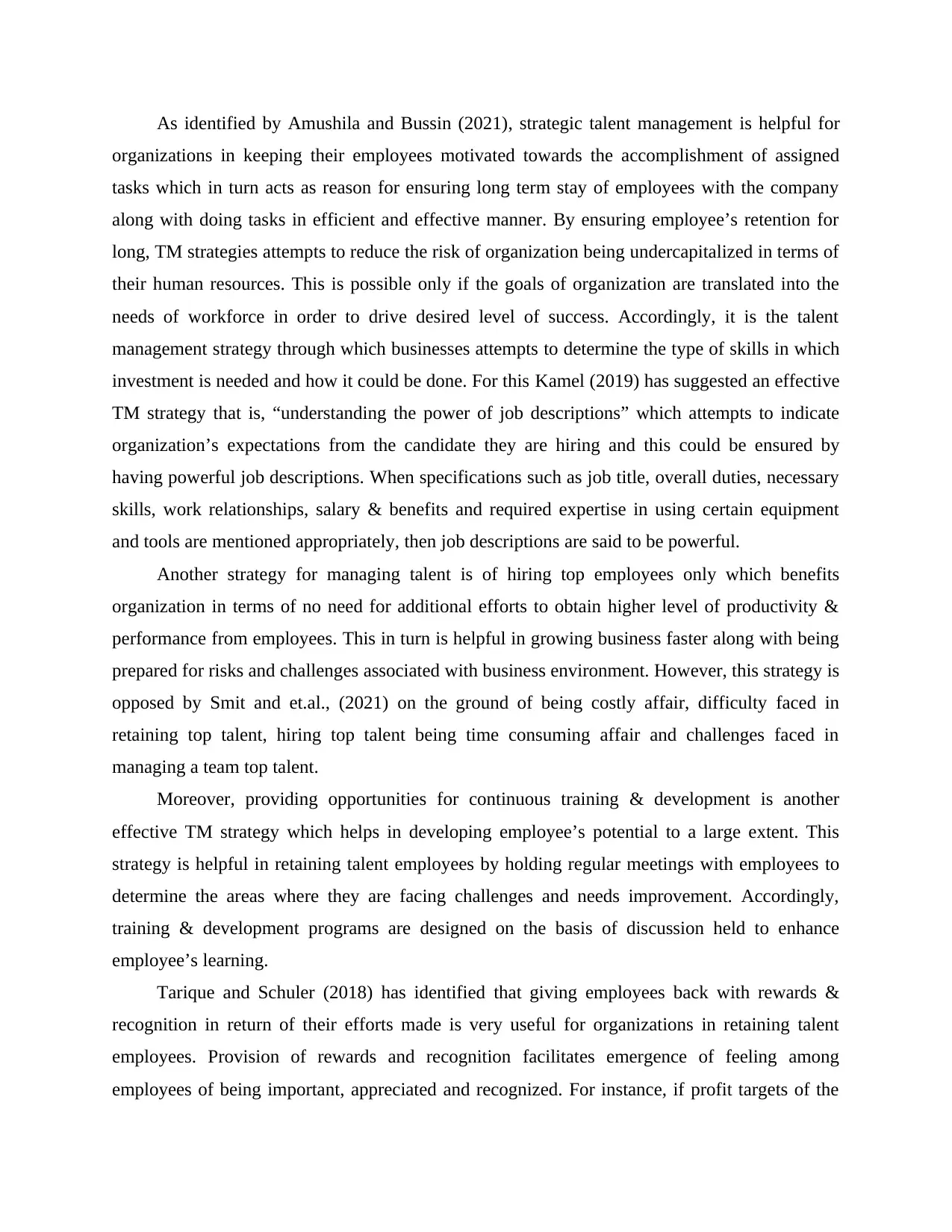
As identified by Amushila and Bussin (2021), strategic talent management is helpful for
organizations in keeping their employees motivated towards the accomplishment of assigned
tasks which in turn acts as reason for ensuring long term stay of employees with the company
along with doing tasks in efficient and effective manner. By ensuring employee’s retention for
long, TM strategies attempts to reduce the risk of organization being undercapitalized in terms of
their human resources. This is possible only if the goals of organization are translated into the
needs of workforce in order to drive desired level of success. Accordingly, it is the talent
management strategy through which businesses attempts to determine the type of skills in which
investment is needed and how it could be done. For this Kamel (2019) has suggested an effective
TM strategy that is, “understanding the power of job descriptions” which attempts to indicate
organization’s expectations from the candidate they are hiring and this could be ensured by
having powerful job descriptions. When specifications such as job title, overall duties, necessary
skills, work relationships, salary & benefits and required expertise in using certain equipment
and tools are mentioned appropriately, then job descriptions are said to be powerful.
Another strategy for managing talent is of hiring top employees only which benefits
organization in terms of no need for additional efforts to obtain higher level of productivity &
performance from employees. This in turn is helpful in growing business faster along with being
prepared for risks and challenges associated with business environment. However, this strategy is
opposed by Smit and et.al., (2021) on the ground of being costly affair, difficulty faced in
retaining top talent, hiring top talent being time consuming affair and challenges faced in
managing a team top talent.
Moreover, providing opportunities for continuous training & development is another
effective TM strategy which helps in developing employee’s potential to a large extent. This
strategy is helpful in retaining talent employees by holding regular meetings with employees to
determine the areas where they are facing challenges and needs improvement. Accordingly,
training & development programs are designed on the basis of discussion held to enhance
employee’s learning.
Tarique and Schuler (2018) has identified that giving employees back with rewards &
recognition in return of their efforts made is very useful for organizations in retaining talent
employees. Provision of rewards and recognition facilitates emergence of feeling among
employees of being important, appreciated and recognized. For instance, if profit targets of the
organizations in keeping their employees motivated towards the accomplishment of assigned
tasks which in turn acts as reason for ensuring long term stay of employees with the company
along with doing tasks in efficient and effective manner. By ensuring employee’s retention for
long, TM strategies attempts to reduce the risk of organization being undercapitalized in terms of
their human resources. This is possible only if the goals of organization are translated into the
needs of workforce in order to drive desired level of success. Accordingly, it is the talent
management strategy through which businesses attempts to determine the type of skills in which
investment is needed and how it could be done. For this Kamel (2019) has suggested an effective
TM strategy that is, “understanding the power of job descriptions” which attempts to indicate
organization’s expectations from the candidate they are hiring and this could be ensured by
having powerful job descriptions. When specifications such as job title, overall duties, necessary
skills, work relationships, salary & benefits and required expertise in using certain equipment
and tools are mentioned appropriately, then job descriptions are said to be powerful.
Another strategy for managing talent is of hiring top employees only which benefits
organization in terms of no need for additional efforts to obtain higher level of productivity &
performance from employees. This in turn is helpful in growing business faster along with being
prepared for risks and challenges associated with business environment. However, this strategy is
opposed by Smit and et.al., (2021) on the ground of being costly affair, difficulty faced in
retaining top talent, hiring top talent being time consuming affair and challenges faced in
managing a team top talent.
Moreover, providing opportunities for continuous training & development is another
effective TM strategy which helps in developing employee’s potential to a large extent. This
strategy is helpful in retaining talent employees by holding regular meetings with employees to
determine the areas where they are facing challenges and needs improvement. Accordingly,
training & development programs are designed on the basis of discussion held to enhance
employee’s learning.
Tarique and Schuler (2018) has identified that giving employees back with rewards &
recognition in return of their efforts made is very useful for organizations in retaining talent
employees. Provision of rewards and recognition facilitates emergence of feeling among
employees of being important, appreciated and recognized. For instance, if profit targets of the
Paraphrase This Document
Need a fresh take? Get an instant paraphrase of this document with our AI Paraphraser
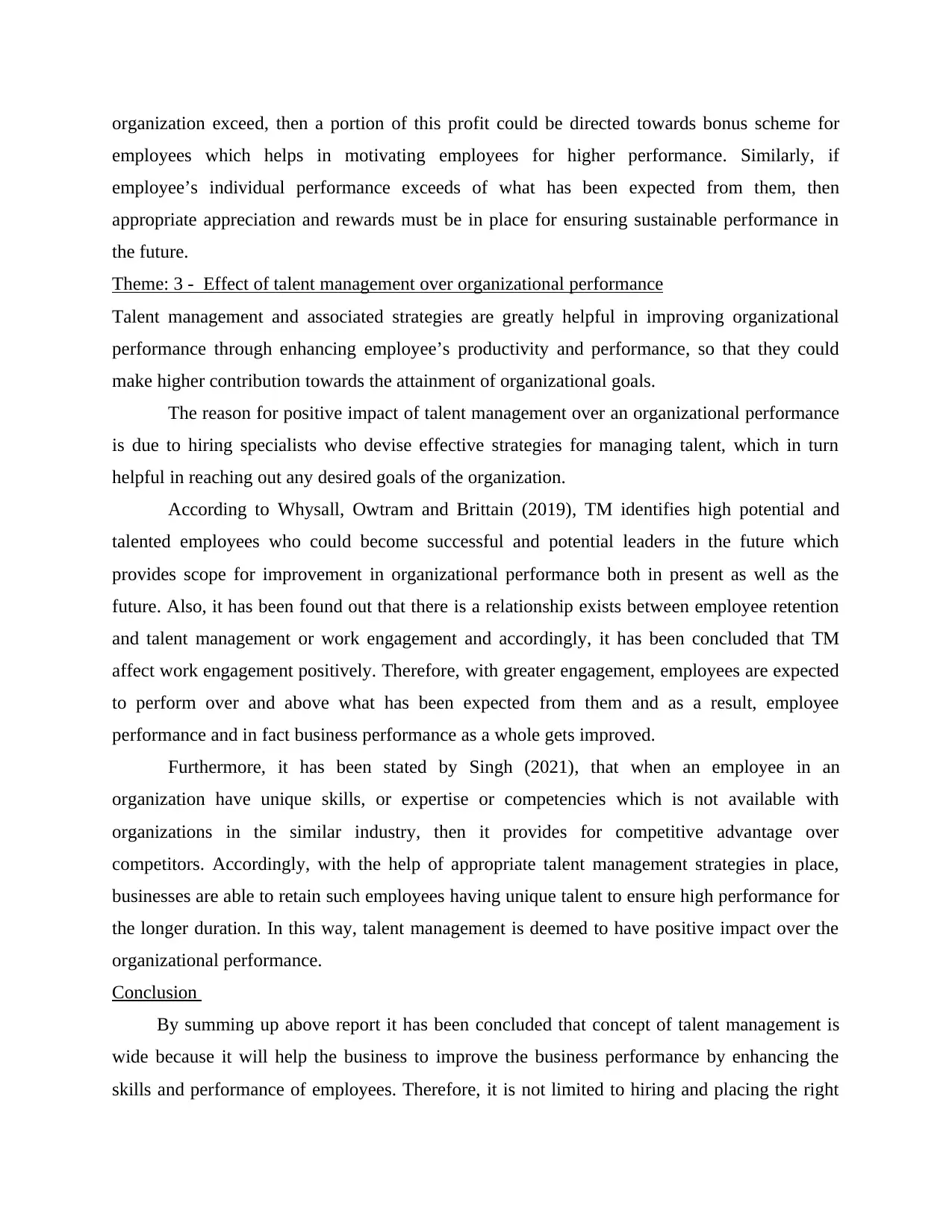
organization exceed, then a portion of this profit could be directed towards bonus scheme for
employees which helps in motivating employees for higher performance. Similarly, if
employee’s individual performance exceeds of what has been expected from them, then
appropriate appreciation and rewards must be in place for ensuring sustainable performance in
the future.
Theme: 3 - Effect of talent management over organizational performance
Talent management and associated strategies are greatly helpful in improving organizational
performance through enhancing employee’s productivity and performance, so that they could
make higher contribution towards the attainment of organizational goals.
The reason for positive impact of talent management over an organizational performance
is due to hiring specialists who devise effective strategies for managing talent, which in turn
helpful in reaching out any desired goals of the organization.
According to Whysall, Owtram and Brittain (2019), TM identifies high potential and
talented employees who could become successful and potential leaders in the future which
provides scope for improvement in organizational performance both in present as well as the
future. Also, it has been found out that there is a relationship exists between employee retention
and talent management or work engagement and accordingly, it has been concluded that TM
affect work engagement positively. Therefore, with greater engagement, employees are expected
to perform over and above what has been expected from them and as a result, employee
performance and in fact business performance as a whole gets improved.
Furthermore, it has been stated by Singh (2021), that when an employee in an
organization have unique skills, or expertise or competencies which is not available with
organizations in the similar industry, then it provides for competitive advantage over
competitors. Accordingly, with the help of appropriate talent management strategies in place,
businesses are able to retain such employees having unique talent to ensure high performance for
the longer duration. In this way, talent management is deemed to have positive impact over the
organizational performance.
Conclusion
By summing up above report it has been concluded that concept of talent management is
wide because it will help the business to improve the business performance by enhancing the
skills and performance of employees. Therefore, it is not limited to hiring and placing the right
employees which helps in motivating employees for higher performance. Similarly, if
employee’s individual performance exceeds of what has been expected from them, then
appropriate appreciation and rewards must be in place for ensuring sustainable performance in
the future.
Theme: 3 - Effect of talent management over organizational performance
Talent management and associated strategies are greatly helpful in improving organizational
performance through enhancing employee’s productivity and performance, so that they could
make higher contribution towards the attainment of organizational goals.
The reason for positive impact of talent management over an organizational performance
is due to hiring specialists who devise effective strategies for managing talent, which in turn
helpful in reaching out any desired goals of the organization.
According to Whysall, Owtram and Brittain (2019), TM identifies high potential and
talented employees who could become successful and potential leaders in the future which
provides scope for improvement in organizational performance both in present as well as the
future. Also, it has been found out that there is a relationship exists between employee retention
and talent management or work engagement and accordingly, it has been concluded that TM
affect work engagement positively. Therefore, with greater engagement, employees are expected
to perform over and above what has been expected from them and as a result, employee
performance and in fact business performance as a whole gets improved.
Furthermore, it has been stated by Singh (2021), that when an employee in an
organization have unique skills, or expertise or competencies which is not available with
organizations in the similar industry, then it provides for competitive advantage over
competitors. Accordingly, with the help of appropriate talent management strategies in place,
businesses are able to retain such employees having unique talent to ensure high performance for
the longer duration. In this way, talent management is deemed to have positive impact over the
organizational performance.
Conclusion
By summing up above report it has been concluded that concept of talent management is
wide because it will help the business to improve the business performance by enhancing the
skills and performance of employees. Therefore, it is not limited to hiring and placing the right
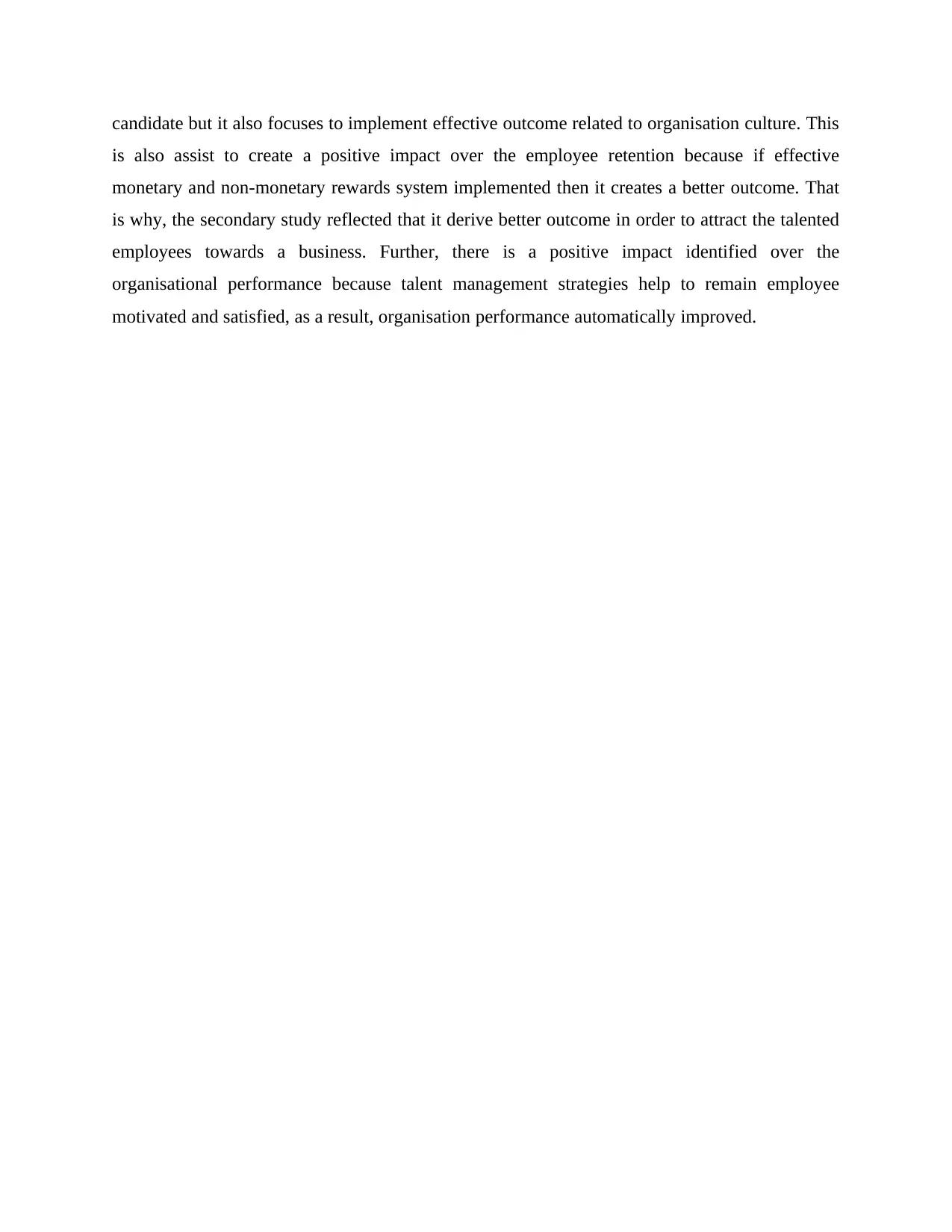
candidate but it also focuses to implement effective outcome related to organisation culture. This
is also assist to create a positive impact over the employee retention because if effective
monetary and non-monetary rewards system implemented then it creates a better outcome. That
is why, the secondary study reflected that it derive better outcome in order to attract the talented
employees towards a business. Further, there is a positive impact identified over the
organisational performance because talent management strategies help to remain employee
motivated and satisfied, as a result, organisation performance automatically improved.
is also assist to create a positive impact over the employee retention because if effective
monetary and non-monetary rewards system implemented then it creates a better outcome. That
is why, the secondary study reflected that it derive better outcome in order to attract the talented
employees towards a business. Further, there is a positive impact identified over the
organisational performance because talent management strategies help to remain employee
motivated and satisfied, as a result, organisation performance automatically improved.
⊘ This is a preview!⊘
Do you want full access?
Subscribe today to unlock all pages.

Trusted by 1+ million students worldwide
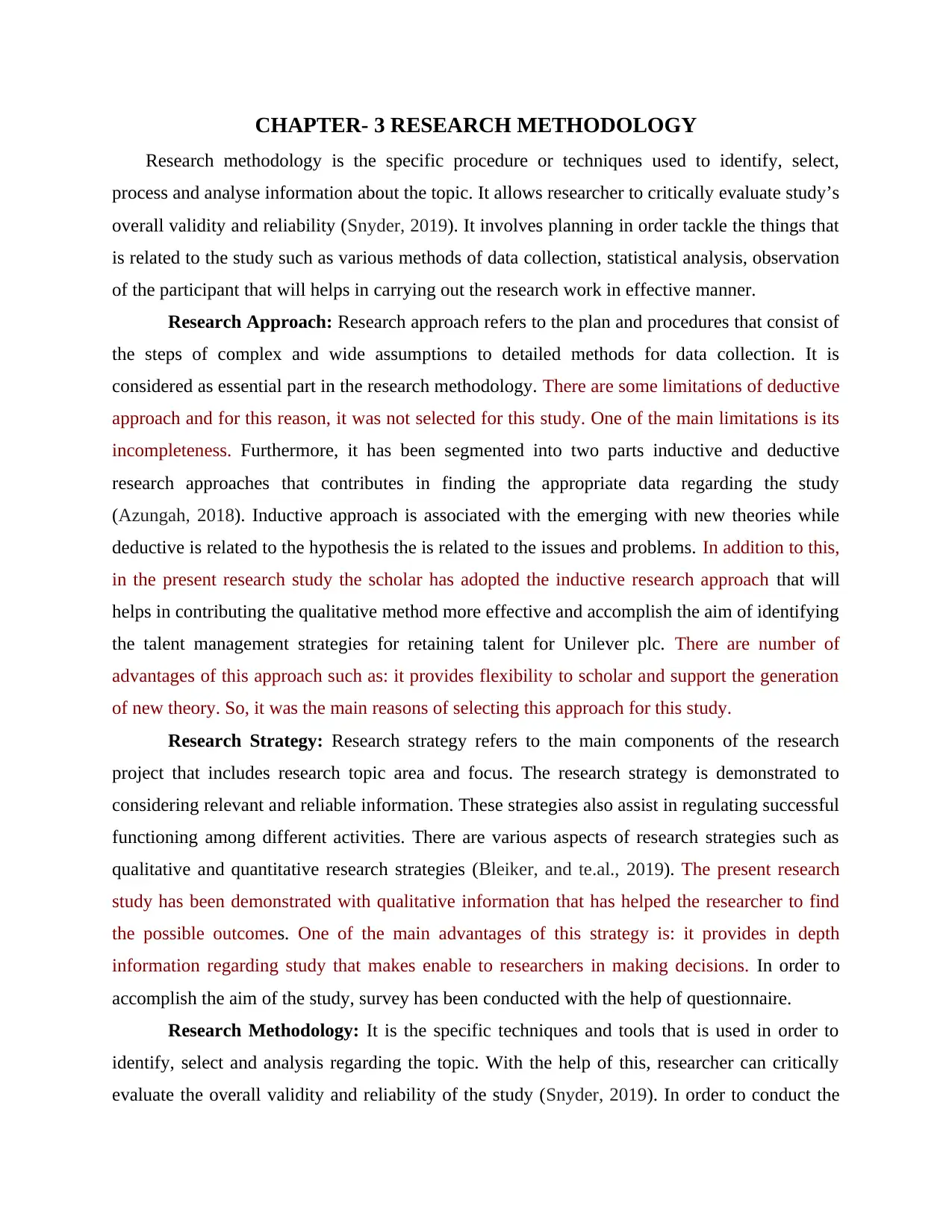
CHAPTER- 3 RESEARCH METHODOLOGY
Research methodology is the specific procedure or techniques used to identify, select,
process and analyse information about the topic. It allows researcher to critically evaluate study’s
overall validity and reliability (Snyder, 2019). It involves planning in order tackle the things that
is related to the study such as various methods of data collection, statistical analysis, observation
of the participant that will helps in carrying out the research work in effective manner.
Research Approach: Research approach refers to the plan and procedures that consist of
the steps of complex and wide assumptions to detailed methods for data collection. It is
considered as essential part in the research methodology. There are some limitations of deductive
approach and for this reason, it was not selected for this study. One of the main limitations is its
incompleteness. Furthermore, it has been segmented into two parts inductive and deductive
research approaches that contributes in finding the appropriate data regarding the study
(Azungah, 2018). Inductive approach is associated with the emerging with new theories while
deductive is related to the hypothesis the is related to the issues and problems. In addition to this,
in the present research study the scholar has adopted the inductive research approach that will
helps in contributing the qualitative method more effective and accomplish the aim of identifying
the talent management strategies for retaining talent for Unilever plc. There are number of
advantages of this approach such as: it provides flexibility to scholar and support the generation
of new theory. So, it was the main reasons of selecting this approach for this study.
Research Strategy: Research strategy refers to the main components of the research
project that includes research topic area and focus. The research strategy is demonstrated to
considering relevant and reliable information. These strategies also assist in regulating successful
functioning among different activities. There are various aspects of research strategies such as
qualitative and quantitative research strategies (Bleiker, and te.al., 2019). The present research
study has been demonstrated with qualitative information that has helped the researcher to find
the possible outcomes. One of the main advantages of this strategy is: it provides in depth
information regarding study that makes enable to researchers in making decisions. In order to
accomplish the aim of the study, survey has been conducted with the help of questionnaire.
Research Methodology: It is the specific techniques and tools that is used in order to
identify, select and analysis regarding the topic. With the help of this, researcher can critically
evaluate the overall validity and reliability of the study (Snyder, 2019). In order to conduct the
Research methodology is the specific procedure or techniques used to identify, select,
process and analyse information about the topic. It allows researcher to critically evaluate study’s
overall validity and reliability (Snyder, 2019). It involves planning in order tackle the things that
is related to the study such as various methods of data collection, statistical analysis, observation
of the participant that will helps in carrying out the research work in effective manner.
Research Approach: Research approach refers to the plan and procedures that consist of
the steps of complex and wide assumptions to detailed methods for data collection. It is
considered as essential part in the research methodology. There are some limitations of deductive
approach and for this reason, it was not selected for this study. One of the main limitations is its
incompleteness. Furthermore, it has been segmented into two parts inductive and deductive
research approaches that contributes in finding the appropriate data regarding the study
(Azungah, 2018). Inductive approach is associated with the emerging with new theories while
deductive is related to the hypothesis the is related to the issues and problems. In addition to this,
in the present research study the scholar has adopted the inductive research approach that will
helps in contributing the qualitative method more effective and accomplish the aim of identifying
the talent management strategies for retaining talent for Unilever plc. There are number of
advantages of this approach such as: it provides flexibility to scholar and support the generation
of new theory. So, it was the main reasons of selecting this approach for this study.
Research Strategy: Research strategy refers to the main components of the research
project that includes research topic area and focus. The research strategy is demonstrated to
considering relevant and reliable information. These strategies also assist in regulating successful
functioning among different activities. There are various aspects of research strategies such as
qualitative and quantitative research strategies (Bleiker, and te.al., 2019). The present research
study has been demonstrated with qualitative information that has helped the researcher to find
the possible outcomes. One of the main advantages of this strategy is: it provides in depth
information regarding study that makes enable to researchers in making decisions. In order to
accomplish the aim of the study, survey has been conducted with the help of questionnaire.
Research Methodology: It is the specific techniques and tools that is used in order to
identify, select and analysis regarding the topic. With the help of this, researcher can critically
evaluate the overall validity and reliability of the study (Snyder, 2019). In order to conduct the
Paraphrase This Document
Need a fresh take? Get an instant paraphrase of this document with our AI Paraphraser
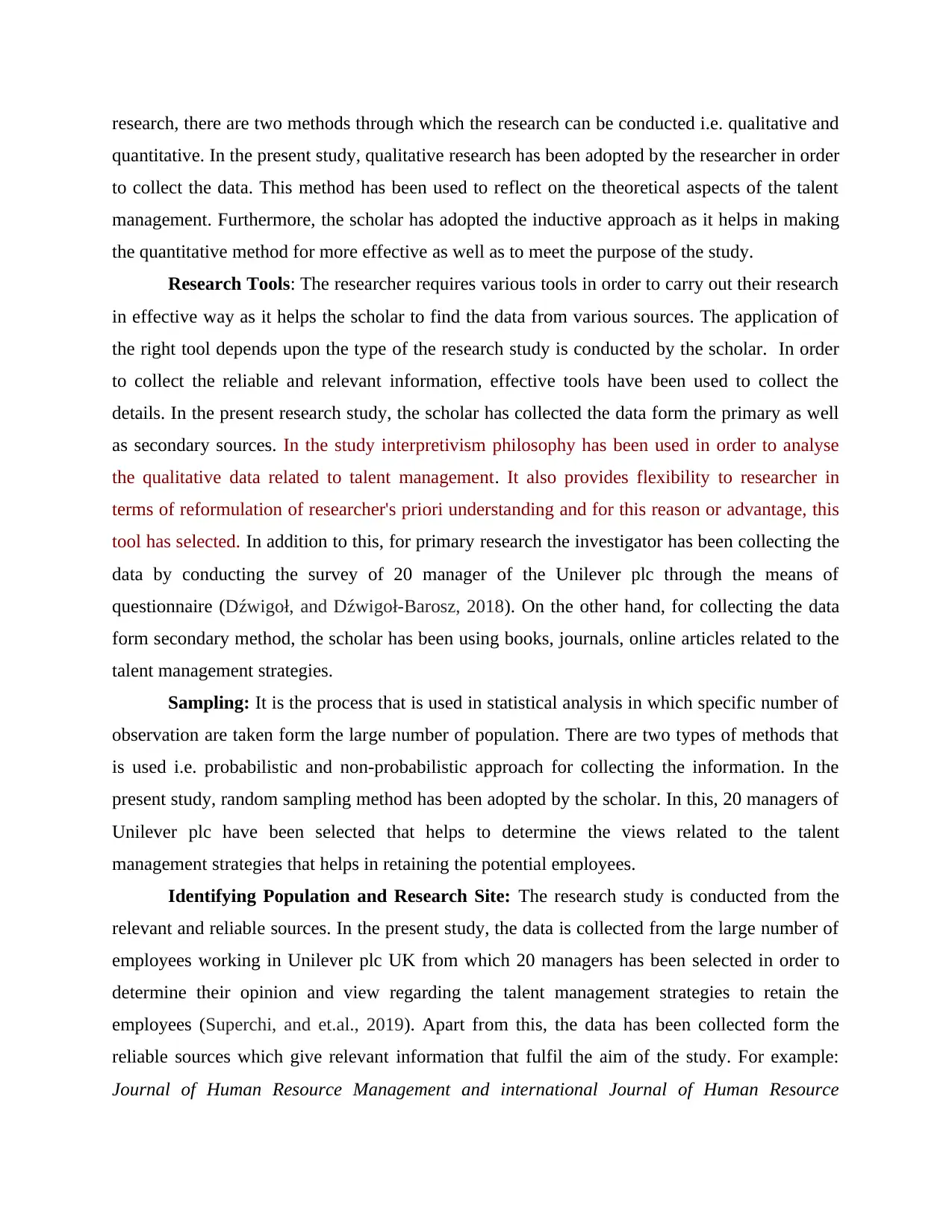
research, there are two methods through which the research can be conducted i.e. qualitative and
quantitative. In the present study, qualitative research has been adopted by the researcher in order
to collect the data. This method has been used to reflect on the theoretical aspects of the talent
management. Furthermore, the scholar has adopted the inductive approach as it helps in making
the quantitative method for more effective as well as to meet the purpose of the study.
Research Tools: The researcher requires various tools in order to carry out their research
in effective way as it helps the scholar to find the data from various sources. The application of
the right tool depends upon the type of the research study is conducted by the scholar. In order
to collect the reliable and relevant information, effective tools have been used to collect the
details. In the present research study, the scholar has collected the data form the primary as well
as secondary sources. In the study interpretivism philosophy has been used in order to analyse
the qualitative data related to talent management. It also provides flexibility to researcher in
terms of reformulation of researcher's priori understanding and for this reason or advantage, this
tool has selected. In addition to this, for primary research the investigator has been collecting the
data by conducting the survey of 20 manager of the Unilever plc through the means of
questionnaire (Dźwigoł, and Dźwigoł-Barosz, 2018). On the other hand, for collecting the data
form secondary method, the scholar has been using books, journals, online articles related to the
talent management strategies.
Sampling: It is the process that is used in statistical analysis in which specific number of
observation are taken form the large number of population. There are two types of methods that
is used i.e. probabilistic and non-probabilistic approach for collecting the information. In the
present study, random sampling method has been adopted by the scholar. In this, 20 managers of
Unilever plc have been selected that helps to determine the views related to the talent
management strategies that helps in retaining the potential employees.
Identifying Population and Research Site: The research study is conducted from the
relevant and reliable sources. In the present study, the data is collected from the large number of
employees working in Unilever plc UK from which 20 managers has been selected in order to
determine their opinion and view regarding the talent management strategies to retain the
employees (Superchi, and et.al., 2019). Apart from this, the data has been collected form the
reliable sources which give relevant information that fulfil the aim of the study. For example:
Journal of Human Resource Management and international Journal of Human Resource
quantitative. In the present study, qualitative research has been adopted by the researcher in order
to collect the data. This method has been used to reflect on the theoretical aspects of the talent
management. Furthermore, the scholar has adopted the inductive approach as it helps in making
the quantitative method for more effective as well as to meet the purpose of the study.
Research Tools: The researcher requires various tools in order to carry out their research
in effective way as it helps the scholar to find the data from various sources. The application of
the right tool depends upon the type of the research study is conducted by the scholar. In order
to collect the reliable and relevant information, effective tools have been used to collect the
details. In the present research study, the scholar has collected the data form the primary as well
as secondary sources. In the study interpretivism philosophy has been used in order to analyse
the qualitative data related to talent management. It also provides flexibility to researcher in
terms of reformulation of researcher's priori understanding and for this reason or advantage, this
tool has selected. In addition to this, for primary research the investigator has been collecting the
data by conducting the survey of 20 manager of the Unilever plc through the means of
questionnaire (Dźwigoł, and Dźwigoł-Barosz, 2018). On the other hand, for collecting the data
form secondary method, the scholar has been using books, journals, online articles related to the
talent management strategies.
Sampling: It is the process that is used in statistical analysis in which specific number of
observation are taken form the large number of population. There are two types of methods that
is used i.e. probabilistic and non-probabilistic approach for collecting the information. In the
present study, random sampling method has been adopted by the scholar. In this, 20 managers of
Unilever plc have been selected that helps to determine the views related to the talent
management strategies that helps in retaining the potential employees.
Identifying Population and Research Site: The research study is conducted from the
relevant and reliable sources. In the present study, the data is collected from the large number of
employees working in Unilever plc UK from which 20 managers has been selected in order to
determine their opinion and view regarding the talent management strategies to retain the
employees (Superchi, and et.al., 2019). Apart from this, the data has been collected form the
reliable sources which give relevant information that fulfil the aim of the study. For example:
Journal of Human Resource Management and international Journal of Human Resource
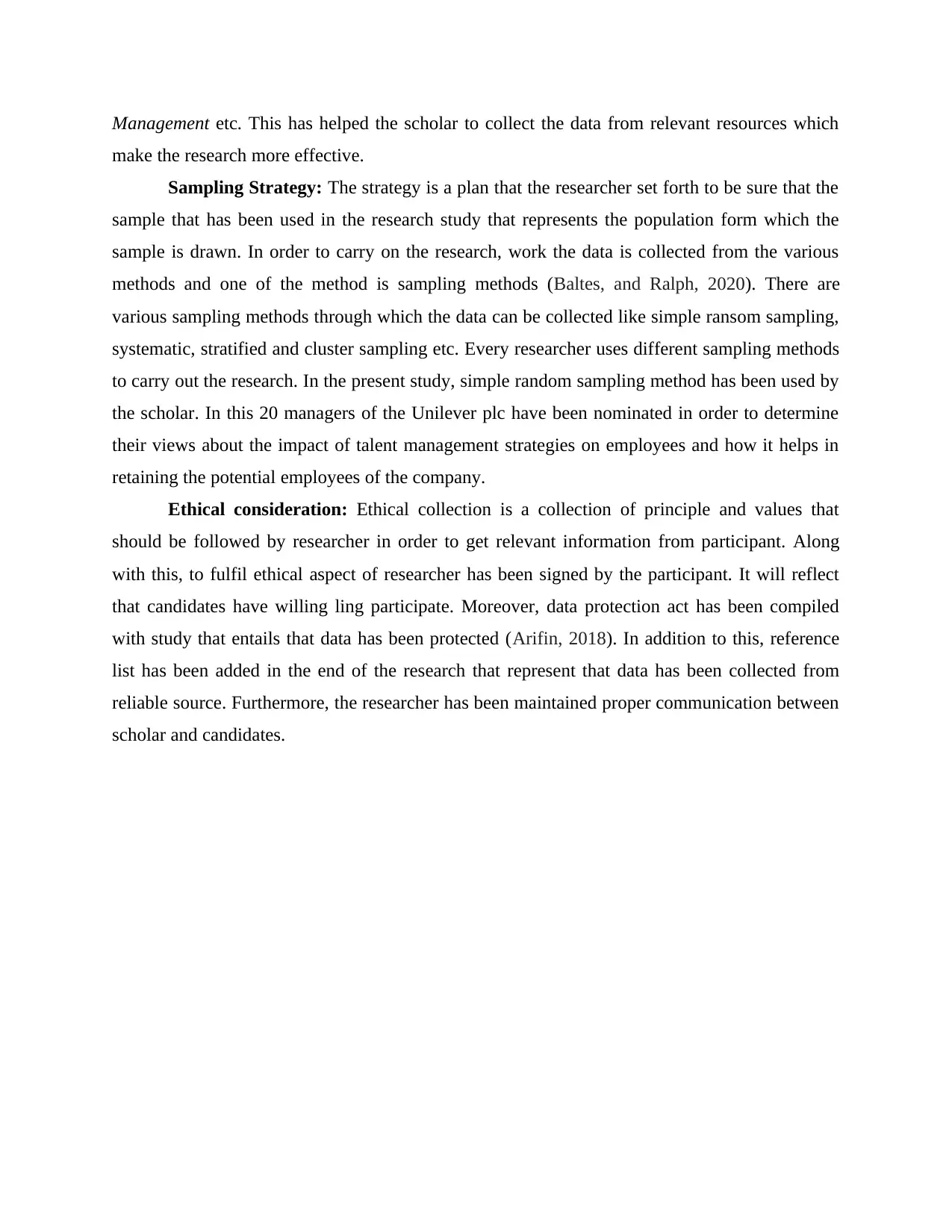
Management etc. This has helped the scholar to collect the data from relevant resources which
make the research more effective.
Sampling Strategy: The strategy is a plan that the researcher set forth to be sure that the
sample that has been used in the research study that represents the population form which the
sample is drawn. In order to carry on the research, work the data is collected from the various
methods and one of the method is sampling methods (Baltes, and Ralph, 2020). There are
various sampling methods through which the data can be collected like simple ransom sampling,
systematic, stratified and cluster sampling etc. Every researcher uses different sampling methods
to carry out the research. In the present study, simple random sampling method has been used by
the scholar. In this 20 managers of the Unilever plc have been nominated in order to determine
their views about the impact of talent management strategies on employees and how it helps in
retaining the potential employees of the company.
Ethical consideration: Ethical collection is a collection of principle and values that
should be followed by researcher in order to get relevant information from participant. Along
with this, to fulfil ethical aspect of researcher has been signed by the participant. It will reflect
that candidates have willing ling participate. Moreover, data protection act has been compiled
with study that entails that data has been protected (Arifin, 2018). In addition to this, reference
list has been added in the end of the research that represent that data has been collected from
reliable source. Furthermore, the researcher has been maintained proper communication between
scholar and candidates.
make the research more effective.
Sampling Strategy: The strategy is a plan that the researcher set forth to be sure that the
sample that has been used in the research study that represents the population form which the
sample is drawn. In order to carry on the research, work the data is collected from the various
methods and one of the method is sampling methods (Baltes, and Ralph, 2020). There are
various sampling methods through which the data can be collected like simple ransom sampling,
systematic, stratified and cluster sampling etc. Every researcher uses different sampling methods
to carry out the research. In the present study, simple random sampling method has been used by
the scholar. In this 20 managers of the Unilever plc have been nominated in order to determine
their views about the impact of talent management strategies on employees and how it helps in
retaining the potential employees of the company.
Ethical consideration: Ethical collection is a collection of principle and values that
should be followed by researcher in order to get relevant information from participant. Along
with this, to fulfil ethical aspect of researcher has been signed by the participant. It will reflect
that candidates have willing ling participate. Moreover, data protection act has been compiled
with study that entails that data has been protected (Arifin, 2018). In addition to this, reference
list has been added in the end of the research that represent that data has been collected from
reliable source. Furthermore, the researcher has been maintained proper communication between
scholar and candidates.
⊘ This is a preview!⊘
Do you want full access?
Subscribe today to unlock all pages.

Trusted by 1+ million students worldwide
1 out of 43
Related Documents
Your All-in-One AI-Powered Toolkit for Academic Success.
+13062052269
info@desklib.com
Available 24*7 on WhatsApp / Email
![[object Object]](/_next/static/media/star-bottom.7253800d.svg)
Unlock your academic potential
Copyright © 2020–2026 A2Z Services. All Rights Reserved. Developed and managed by ZUCOL.




